November 27, 2025 | 20:58 GMT +7
November 27, 2025 | 20:58 GMT +7
Hotline: 0913.378.918
November 27, 2025 | 20:58 GMT +7
Hotline: 0913.378.918
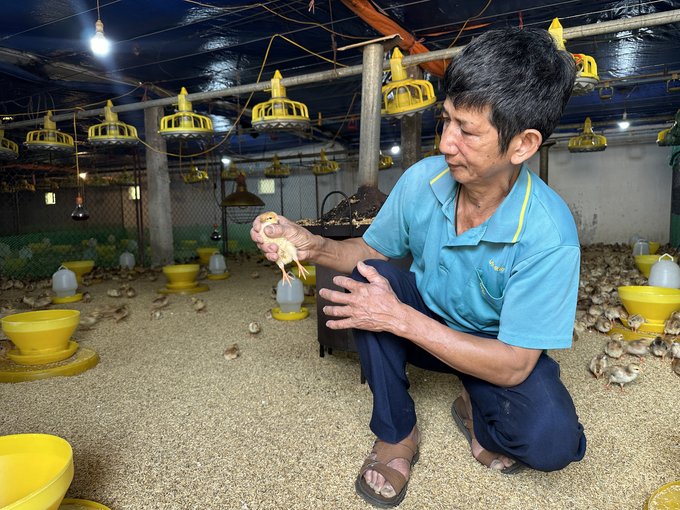
Nguyen Van Phuong, owner of a chicken farm in Phan Me commune, Phu Luong district. Photo: Quang Linh.
In many places, antibiotic resistance in livestock farming remains a strange concept, often only mentioned at scientific conferences or in production plans of large-scale farms. However, in Phu Luong district, Thai Nguyen, many owners of poultry farms with a scale of 5,000 heads can fluently talk about the concept of antibiotic resistance, the risks and ways to prevent and counter this problem.
One thing to note is that these are all farmers over 60 years old, more or less facing some obstacles due to age and traditional farming practices. Nguyen Van Phuong, owner of a 5,000-chicken farm in Co 2 hamlet (Phan Me commune, Phu Luong district) is one of them.
“Antibiotics not only kill pathogenic bacteria but also beneficial bacteria, disrupting the natural balance of intestinal microflora, causing digestive disorders and possibly diarrhea in livestock. Antibiotic resistance will make the use of old antibiotics ineffective and lead to the demand for stronger substances,” Phuong said.
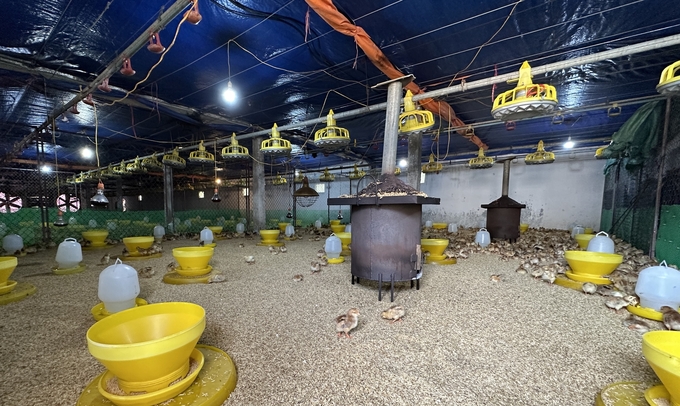
“To limit antibiotics, pathogens must be eliminated from the start” is Phuong's motto. Photo: Quang Linh.
To minimize the risk of livestock infection and reduce the use of antibiotics, Phuong has implemented many biosecurity farming measures, such as using biological bedding, disinfecting and sterilizing barns periodically, preventing other livestock from entering the farm, and feeding chickens green tea dust. Phuong's farm is sprayed with disinfectant solutions both inside and outside the farming area, ensuring that the barn is left empty for 1.5 months in advance before stocking a new flock.
Deputy Director of Phu Luong District Agricultural Service Center Ninh Thi Thang recommends farmers spray around barns to avoid diseases from outside, including farm items and means of transport entering or leaving the barn.
“To limit the use of antibiotics, the chickens must be healthy and disease-free. Right from the start, the source of chicks must be strictly controlled. I only import chicks from reputable companies with quality commitments and absolutely do not use unidentified breeds floating on the market. I make sure to fully vaccinate them according to the regulations of the veterinary agency,” Phuong said.
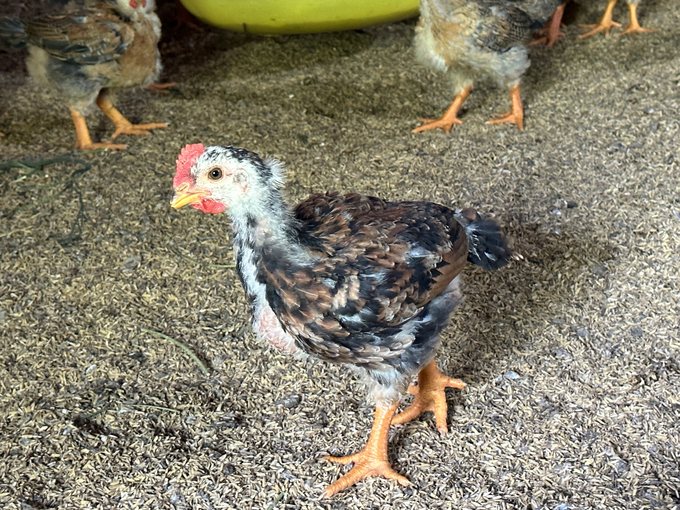
Biological bedding helps chickens reduce stress. Photo: Quang Linh.
Phuong used to collect waste manually and leave a strong odor on the farm, greatly affecting the surrounding environment, human health, and livestock. Through training programs on biosecurity chicken farming techniques and knowledge from the newspaper, Phuong chooses to use biological bedding for the barns.
As a mixture of rice husks and probiotics, biological bedding helps decompose animal manure, thereby reducing toxic gas emissions and odors. Operating on soft bedding instead of hard concrete also helps caged chickens reduce stress.
“Raising chickens with biological bedding helps me reduce a lot of medicine costs for chicken diseases. After cleaning the barn, the bedding also becomes a source of organic fertilizer that fruit growers usually favor. The composted manure is purchased at VND 1,500/kg, twice as high as selling fresh manure,” said Phuong.
According to this old farmer’s calculation, the revenue from selling 1.5 tons of organic fertilizer per batch of chickens helps the farm cover all the costs of buying rice husks for bedding and electricity for a month.
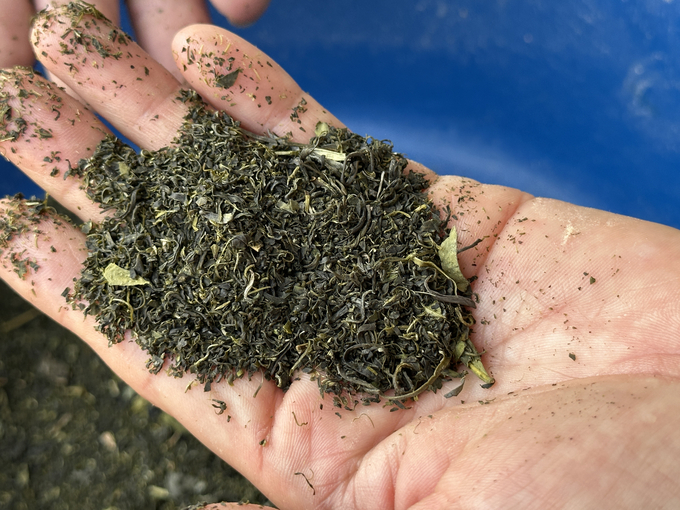
Green tea dust is mixed into animal feed. Photo: Quang Linh.
After attending the workshop on applying green tea dust to animal feed, Phuong, together with scientists and Phu Luong District Agricultural Service Center, gather knowledge and test the model of adding green tea dust to poultry feed.
When mixing 1 kg of green tea dust into 100 kg of bran, he finds that the chickens ate well, grew faster and had no disease problems. Phuong gets tea leaves from safe raw material areas and then dries them, ensuring that the chemical components in the tea leaves are not decomposed. It is later crushed to become green tea dust, which is added to the raw materials used for composting feed.
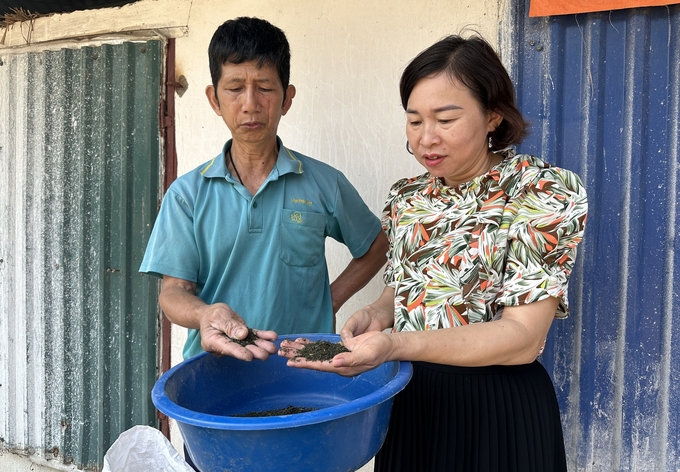
Phu Luong District Agricultural Service Center provides guidance on livestock farming techniques to local farmers. Photo: Quang Linh.
Thanks to the synchronous and effective implementation of biosecurity measures, the survival rate of Phuong's chicken farm is always above 97%. Recently, the unit that signed to purchase chickens from the farm rewarded Phuong VND 20 million because of an amazing achievement. Out of 1,000 chickens sold from Phuong’s farm, only 14 were grade B, the rest were grade A.
After 90 days, the Ho chickens of Phuong's farm weigh approximately 2.8 kg, if raised to 100 days they will weigh 3 kg, usually purchased at around VND 65,000/kg. "Thanks to having clean chickens I do not have to rely on antibiotics, thus reducing disease prevention costs for chickens from VND 8,000/head to VND 4,000/chicken. The farm's profits have increased significantly," Phuong said.
Translated by Samuel Pham

(VAN) On November 27, in the meeting with Minister Tran Duc Thang, Mayor Yin Yong shared Beijing’s experience to improve environment and air quality.

(VAN) After 30 years, both sides identified strategic areas of cooperation: sustainable production, increasing coffee value and training for farmers.
/2025/11/27/4910-4-164708_294.jpg)
(VAN) On the afternoon of November 27 in Beijing, Minister of Agriculture and Environment Tran Duc Thang held a working session with several major Chinese enterprises operating in the agriculture and environment sector.

(VAN) The Department of Animal Health issued a provisional guideline requesting local authorities to increase surveillance, collect samples for testing, and conduct epidemiological investigations according to the established procedure.

(VAN) The United Nations recommends that Vietnam utilize data and artificial intelligence to enhance early disaster warnings and reduce GDP losses by 3.2% in the context of climate change.

(VAN) On the morning of November 27 in Beijing, Minister Tran Duc Thang and the Deputy Commissioner General of the General Administration of Customs of China signed a protocol on fresh jackfruit exports.

(VAN) As floodwaters recede, a vast network of irrigation works across eastern Gia Lai is emerging in a state of severe disrepair, with extensive damage demanding urgent restoration ahead of the 2025-2026 winter-spring cropping season.